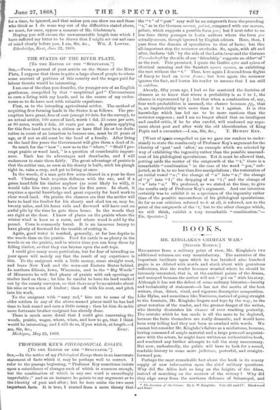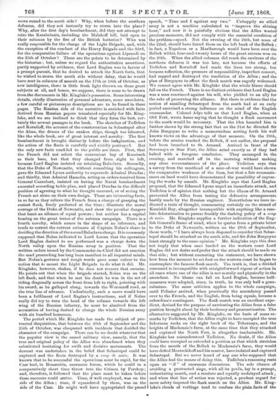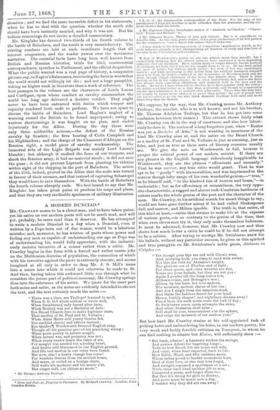BOOKS.
MR. KINGLAKE'S CRIMEAN WAR.* [SECOND NOTICE.]
REGARDED from a military point of view, Mr. Kinglake's two additional volumes are very unsatisfactory. The narrative of the
important incidents upon which he has lavished nine hundred pages is so diluted with words and stuck about with gratuitous reflections, that the reader becomes wearied where ho should be intensely interested, that is, at the cardinal points of the drama, and annoyed because the author will not " get on" with his story. Although it has not the defect of some military histories—brevity and technicality of statement—it has not the merits of the best writers, clear, direct, vivid, and vigorous descriptive composition. Like Hylas, and sometimes like Narcissus, instead of going straight to the fountain, Mr. Kinglake lingers and toys by the way, to the great vexation of the reader, and the greater danger of the writer, who thereby diminishes his chance of ever reaching posterity. The mistake which he has made is all the more to be deplored, because the facts themselves are really dramatic, and would have been very telling had they not been so overlaid with words. We cannot but consider Mr. Kinglake's failure as a misfortune, because, having command of ample material and a large personal acquaint- ance with the actors, he might have written an authoritative book, and rendered any further attempts to tell the story unnecessary. But now, undoubtedly, the public will have to look for a sound, readable history to some more judicious, powerful, and straight- forward pen.
Perhaps the most remarkable fact about the book is its scanty supply of new information upon the chief military questions. 1Vlay did the Allies halt so long on the heights of the Alma, instead of marching on the morrow of the victory ? Why did they edge away from the northern defences of Sebastopol, and • The Invasion of the Crimea. By A. W. Binglake. Vols. III. and IV. Blackwood and Sow. move round to the south side ? Why, when before the southern defences, did they not instantly try to storm into the place P Why, after the first day's bombardment, did they not attempt to seize the Karabelnaia, including the Malakoff hill, laid open to their columns by the fire of the British batteries ? Who was really responsible for the charge of the Light Brigade, and, with the exception of the conduct of the Heavy Brigade and the 93rd, for the comparative failure of the operations against Liprandi on the 25th of October ? These are the points to be determined by the historian ; but, unless we regard the authoritative assertions, partly supported by evidence, that Lord Raglan was in favour of a prompt pursuit, that he desired to attack the North forts, that he wished to storm the south aide without delay, that he would have sent in columns of assault on the 17th or 18th of October, as new intelligence, there is little fresh light thrown on these great subjects at all, and hence, we suppose, there is none to be drawn from the documents in Mr. Kinglake's possession. Some interesting details, chiefly illustrative of personal adventure, some anecdotes, a few careful or picturesque descriptions are to be found in these pages. The Russian aide of the narrative is enriched with facts derived from Russian papers translated especially for Mr. King- lake, and we are inclined to think that they form the best, cer- tainly the newest passages in the book. The sketches of Todleben and Korniloff, the account of the consternation in Sebastopol after the Alma, the drama of the sunken ships, though too laboured, like the whole book, are of great interest and novelty. The first bombardment is brought distinctly before the imagination, and the action of the fleets is carefully and vividly portrayed. But the only new facts confided to the public are three. First, that the French did not select the convenient bay of Katniesch as their base, but that they changed from right to left, because Lord Raglan insisted on retaining Balaclava. Secondly, that the Duke of Newcastle, without consulting his colleagues, gave Sir Edmund Lyons authority to supersede Admiral Dundee ; and thirdly, that Admiral Hamelin, acting on orders received from General Canrobert, insisted on having the Naval bombardment executed according to his plan, and placed Dundee in the difficult position of agreeing to what he thought unsound, or of seeing the French act alone on their own design. These are interesting facts, in so far as they relieve the French from a charge of grasping the easiest flank, freely preferred at the time ; illustrate the moral courage of the Duke of Newcastle, and show the peculiar dangers that beset an alliance of equal powers ; but neither has a capital bearing on the great issues of the autumn campaign. There is a fourth novelty, which comes in the shape of an inference, and tends to correct the current estimate of Captain Nolan's share in deciding the direction of the second Balaclava charge. It is commonly supposed that Nolan indicated to Lord Lucan that the operation Lord Raglan desired to see performed was a charge down the North valley upon the Russian army in position. That the written orders issued by the Commander-in-Chief did not sanction the mad proceeding has long been manifest to all impartial minds. But Nolan's gestures and rough words gave some colour to the notion that he meant the Light Brigade to do what it did. Mr. Kinglake, however, shakes, if he does not remove that surmise. He points out that when the brigade started, Nolan was on the left flank, and that when he met his death he was in the act of riding diagonally across the front from left to right, pointing with his sword, as he galloped along, towards the Woronzoff road, as the true line of advance. Undoubtedly, such a move would have been a fulfilment of Lord Raglan's instructions, and if Nolan really did try to turn the head of the column towards the left wing of the Russian infantry, he must be absolved from the accusation of having desired to charge the whole Russian army with six hundred horsemen.
The period which Mr. Kinglake has made the subject of pro- tracted disquisition, that between the 20th of September and the 25th of October, was chequered with incidents that decided the character of the campaign. There can be no doubt whatever that the popular view is the sound military view, namely, that the true and original policy of the Allies was abandoned when they substituted hesitating for swift and decisive movements. The descent was undertaken in the belief that Sebastopol could be captured and the fleets destroyed by a coup de main. It was known that to be successful the operations must be rapid, for the Czar had, in Bessarabia, enormous forces, which he could in a comparatively short time throw into the Crimea by Perekop ; and, therefore, it followed that the place must be taken before these succours could arrive. Time, if well employed, was on the side of the Allies ; time, if squandered by them, was on the side of the Czar. He might well have appropriated the proud speech, " Time and I against any two." Unhappily an allied army is not a machine calculated to "improve the shining hour," and now it is painfully obvious that the Allies wasted precious moments, did not comply with the essential condition of the problem—speed. Not the evening of the 24th, but noon of the 22nd, should have found them on the left bank of the Belbek ; in fact, a Napoleon or a Marlborough would have been over the Belbek within four-and-twenty hours of the great success won on the 20th. When the allied columns did reach the environs of the northern defences it was too late, not because the efforts of Todleben and Korniloff had made the lines too strong, but because reflection, the pressure of responsibility, imperfect concert, had sapped and destroyed the resolution of the Allies ; and the plan of Burgoyne to effect the flank march was eagerly welcomed. We cannot agree with Mr. Kinglake that the whole blame should fall on the French. There is no distinct evidence that Lord Raglan was a man convinced against his will, who yielded to an ally for the sake of preserving the alliance. But there is evidence that the notion of assailing Sebastopol from the south had at an early period exercised a strong influence on the mind of the English commander. Colonel Adye tells us that Lord Raglan, when at Old Fort, wrote home saying that he thought a flank movement to the south would be necessary. That the idea haunted him is further shown by the strong fact that on the 21st he directed Sir John Burgoyne to write a memorandum setting forth his well known views on the advantage of that measure. On the 24th, before the armies reached the Belbek, if not earlier, the proposal had been broached to St. Arnaud. Arrived in front of the Severnaya or Star Fort, the Allies acted exactly as if they had halted with a foregone conclusion. They encamped in the evening, and marched off in the morning without making any close reconnaissance of the place. Todleben says that a survey from the masthead of a man-of-war would have shown the comparative weakness of the lines, but that a fair reconnais- sance on land would have demonstrated the possibility of captur- ing the works by assault. Mr. Kinglake says that Lord Raglan proposed, that Sir Edmund Lyons urged an immediate attack, and Todleben is of opinion that nothing but the illness of St. Arnaud prevented the Allies from testing the defensive arrangements hastily made by the Russian engineer. Nevertheless we have in- dicated a train of thought, commencing certainly on the strand of Kamishli Bay, altogether incompatible with anything like a reso- lute determination to pursue frankly the dashing policy of a coup de main. Mr. Kinglake supplies a further indication of the Eng- lish General's frame of mind, when he quotes from a private letter to the Duke of Newcastle, written on the 28th of September, these words, " I have always been disposed to consider that Sebas- topol should be attacked on the south side, and Sir John Burgoyne leant strongly to the same opinion." Mr. Kinglake says this does not imply that when once landed on the western coast Lord Raglan did not desire and prefer that the attack should be made on that side ; but without contesting the statement, we have shown how from the moment he set foot on the western coast he began to contemplate the famous flank march. The truth is, that a divided command is incompatible with straightforward vigour of action in all cases where one of the allies is not morally and physically in the ascendant. No blame can fall on Lord Raglan, because half- measures were adopted, since, in truth, he was only half a gene- ralissimo. The same criticism applies to the whole campaign, until Pelissier arrived, when practically the ascendancy passed over to the French, and the English, from being equals, became a subordinate contingent. The flank march was an excellent expe- dient, devised for the purpose of extricating the Allies from a false position brought about by their hesitancy and procrastination. The alternative suggested by Mr. Kinglake, on the basis of some re- marks by Todleben, that the Allies ought to have occupied the true Inkermau rocks on the right bank of the Tchernaya, and the heights of Mackenzie's farm, at the same time that they attacked and captured the North Fort, is altogether inadmissible. Mr. Kinglake has misunderstood Todleben. No doubt, if the Allies could have occupied so extended a position as that which stretches from the mouth of the Belbek to Mackenzie's farm, they would have defied Mentschikoff and his master, have isolated and captured Sebastopol. But we never heard of any one who supposed that the Allies had the means of doing this. Todleben's reasoning rests upon an " if " of enormous dimensions. The sole chance of avoiding a protracted siege, with all its perils, lay in a prompt, unhesitating march, and a resolute and equally undelayed attack ; and when that line of action was rejected, a prudent regard for mere safety imposed the flank march on the Allies. Mr. King- lake's clouds of verbiage tend to confuse the plain facts of the
situation ; and we find the same incurable defect in his statements, when he has to deal with the question whether the south side should have been instantly assailed, and why it was not. But his tedious reasonings do not invite a detailed commentary.
Mr. Kinglake has devoted two-thirds of his fourth volume to the battle of Balaclava, and the result is very unsatisfactory. The stirring combats are told at such inordinate length that all interest evaporates, and the reader yawns over the wearisome narrative. The essential facts have long been well known from British and Russian histories, trials for libel, controversial correspondence, speeches in Parliament, and the official despatches. What the public wanted was a real page of history, a companion picture, say, to Napier's Salamanca, recounting the factain wordatbat the world would not willingly let die ; and not a huge pamphlet, taking no higher rank in literature than a work of reference. The best passages in the volume are the characters of Lords Lucan and Cardigan, upon whose conduct as cavalry commanders the world has long ago delivered a decisive verdict. They ought never to have been entrusted with duties which temper and capacity rendered both unfit to perform. We have not space to discuss the battle of Balaclava. Lord Raglan's neglect of a warning caused the British to be found unprepared ; owing to various shortcomings it was fought on no plan, and ended
injuriously for the Allies. During the day there were only three soldierlike actions,—the defeat of the Russian cavalry by Scarlett ; the firm bearing of Colin Campbell and his Highlanders ; and the charge of the Chasseurs d'Afrique on the Russian right, a model piece of cavalry workmanship. The immortal ride of the Light Brigade was mainly Lord Lucan's blunder ; but although it exalted the fame of our troopers, and shook the Russian army, it had no material result ; it did not save the guns ; it did not prevent Liprandi from planting his videttes within sight of the shipping in the port of Balaclava. The action of the 23th, indeed, proved to the Allies that the scale was turned in favour of their enemies, and that instead of capturing Sebastopol they would have to save themselves. With the battle of Balaclava the fourth volume abruptly ends. We feel bound to say that Mr. Kinglake has taken great pains to produce his maps and plans, and that they are very creditable specimens of military illustration.
































 Previous page
Previous page